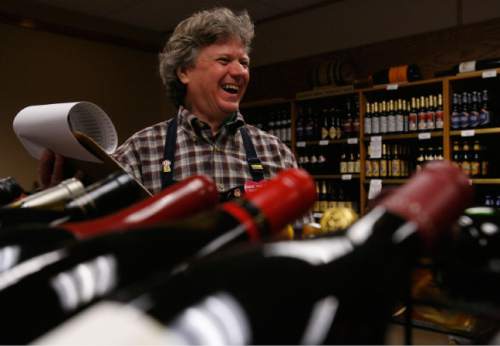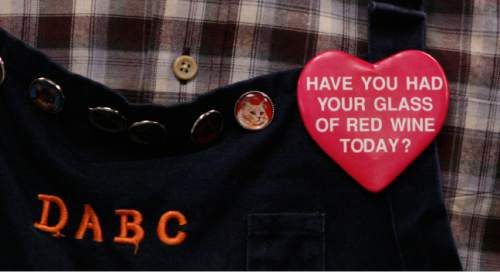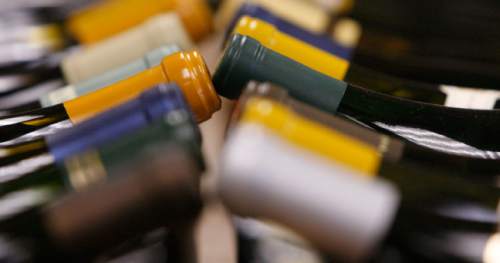This is an archived article that was published on sltrib.com in 2015, and information in the article may be outdated. It is provided only for personal research purposes and may not be reprinted.
Just days after liquor store manager Ron Harris announced his April 24 retirement, his bosses at the Utah Department of Alcoholic Beverage Control (DABC) gave the 20-year employee an unusual send-off: They forced him to clean out his desk and placed him on paid administrative leave.
The move blindsided Harris, the longtime manager at Salt Lake City's Metro Wine Store, 255 S. 300 East.
In protest, Gary Clark, the store's assistant manager — who had planned to retire March 28 — left his job on the spot.
With Harris and Clark gone, customers at the Metro store, one of the busiest and highest-grossing liquor stores in the state, have lost more than 55 combined years of liquor knowledge and customer-service experience.
Harris did not want to comment about the incident, but Clark blasted the DABC, saying "Gestapo-like" tactics have been a regular occurrence.
"I didn't appreciate how they handled things with Ron," Clark said, noting that DABC officials even changed the Metro store locks on the day Harris was asked to leave. "It really upsets me."
DABC spokeswoman Vickie Ashby declined to talk about the situation, saying only, "We do not comment on confidential personnel matters."
Clark said he and Harris have been vocal opponents of a new centralized ordering system the DABC touts as being more efficient and more responsive to inventory needs. Clark says the computerized system has created problems:
• It is a one-size-fits-all system that doesn't allow store managers to individualize inventory according to local preferences.
• Time spent on daily inventory paperwork has nearly doubled, taking employees away from other duties, including stocking shelves and helping customers.
• It limits inventory, causing stores to run out of popular items.
"Our level of stock was pathetic," Clark said of the Metro store. "If you run out of things, it doesn't matter to them."
It's not just employees who have noticed changes in availability and service. Restaurants and bars say it is affecting their bottom line.
"Last week, I went to three different wine stores three days in a row to get what I needed," said Louie Koppel, the sommelier at the BTG Wine Bar.
And, increasingly, restaurant and bar owners say they must special-order wines, which can take weeks to arrive.
The situation has frustrated business owners as the quantity of beer, wine and spirits available in the U.S. has exploded in recent years, and Utah consumers — who are well-traveled and are becoming more educated — are interested in trying them.
DABC Executive Director Sal Petilos, in an email response, acknowledged that the centralized order system has drawn criticism since its implementation. The Office of the Legislative Auditor General reviewed the program as part of a March 2014 audit.
Quoting directly from the report, Petilos said that auditors generally found that the program is "improving the efficiency and effectiveness of retail operations," and since its implementation, "stock-outs have decreased, the accuracy of shipments has improved, and excess inventory at state stores has decreased."
Petilos said he shared customers' frustration with out-of-stock products, adding that it was something the department continues to monitor.
"Department data indicate that systemwide, while store inventories continue to decrease, stock-outs continue their downward trend in an environment of increased sales/demand," he wrote.
Since the ordering system has been implemented, the DABC has seen an increase in the number of special-order requests. Most of the requests are from restaurants, but individual customer requests have increased as well.
Restaurant and bar owners say the special orders began to increase when the state-run liquor monopoly started cutting back on the number of new products allowed in the system, a huge change from four or five years ago, when Brett Clifford was in charge. Clifford, the man credited with building Utah's premium wine program into a national success story, resigned in February 2012 in a dispute over DABC policies. At the time, he predicted that the DABC would cut the number of liquor options for customers.
"I find it all very sad and depressing after having spent a large part of my working life trying to help make that agency something to be proud of," Clifford said. "After decades of growth and innovation under strict liquor laws, the DABC is now in a slow downward spiral."
Petilos dismissed the notion that new products and variety have suffered, noting there are about 5,900 active items in the state system.
"I am somewhat surprised by the claim that centralized ordering limits new product availability in Utah," Petilos wrote. "From the department's perspective, centralized ordering, because it relies on actual sales data, provides transparency into product performance and assists in identifying items that should be de-listed because they fail to meet performance standards, thereby making more room for new products to enter the system."







